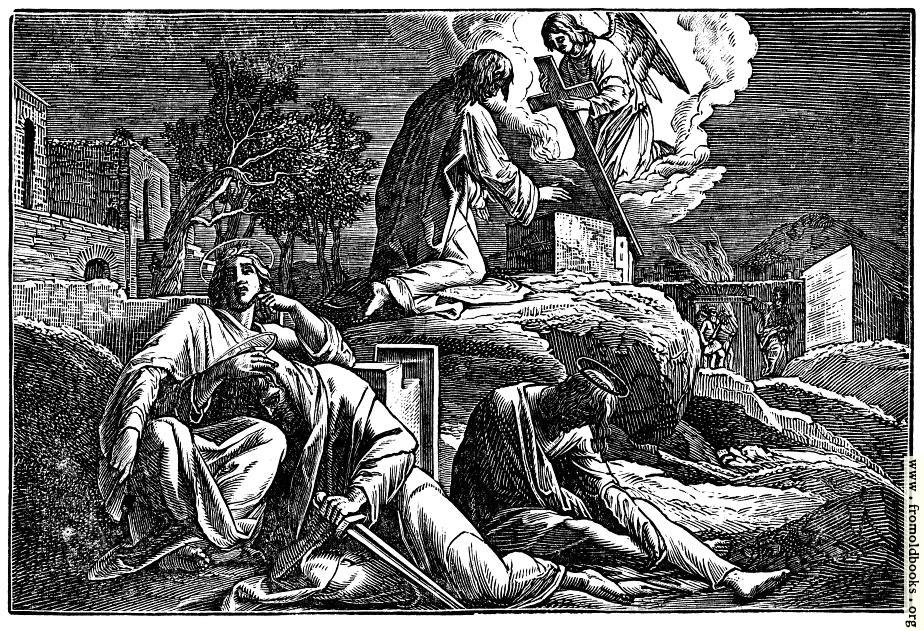Militant atheism takes that duality which is specially reserved for politics (and even then it shouldn't really be that way) and asserts itself into the social order. However, unlike political parties, Militant atheism or even just normal atheism is not self sufficient. Whereas the theist finds purpose through the love and truths that God provides, the militant atheist finds purpose through the assault the beliefs of the theist. Really, the atheists should thank the theists for the foundation of their religious beliefs; without theism there would be no atheism. Militant atheism is like the bully that derives a great deal of satisfaction from knocking down the lego tower that another child builds. The bully, or destroyer, needs a builder to build something up in order for him to then tear down that same structure.
Anyways, to illustrate my main point I would like to start with this short excerpt from Fulton Sheen:
"A few years ago I encountered a young atheist in the vestibule of a Catholic Church in London who, boasting of her atheism, shouted: "Every night I go out to Hyde Park and talk against God. I urge my listeners to drive the illusion from the earth. I circulate England, Scotland, and Wales with pamphlets denouncing a belief in God." When she drew a deep breath thus giving me my just opportunity to speak I said to her: "Suppose I went across the street here to Soho Square and every night talked against 20-footed ghosts and 10-legged centaurs; suppose I circulated England, Scotland. and Wales with pamphlets denouncing a belief in 20-footed ghosts and 10-legged centaurs. What would happen to me?" She said: "You would be crazy; they would lock you up." "Correct," said I "Now, tell me, why don’t they lock you up? Don’t you put God in exactly the same category of illusion as that in which I put a 20-footed ghost and a 10-legged centaur? Why would I be crazy and not you?” I had to tell her the answer: "Because if I attacked ghosts or centaurs the reason of men and the tradition of mankind would tell me I was attacking a figment of my imagination– which is a mark of insanity. But when you attack God you are not attacking an illusion but something just as real as the thrust of a sword or an embrace. It is the reality of God which saves you from insanity and it is the reality of God which gives substance and energy to your attacks." And she answered: "I hate you!” To which I answered: "Now you have answered me. Atheism is not a doctrine, it is a cry of wrath. Do you think we would have prohibition in this world without something to prohibit? Could there be any cigarette laws without cigarettes? How can there be atheism without something to atheiate?
 The main point I would like to make here is that there are many people in this world who believe many different things; this is a fact. Making a religion out of specifically targeting any belief is just bad form. I can believe for an example, that Buddhism is a false religion, but I do not seek its destruction. I do not stand outside of temples protesting, or more practically, blogging about them. My happiness certainly is not contingent on converting people from Buddhism or for that matter any other religion. I will not talk to someone and merely insult their religion in attempts to convert them either. I have better things to do. Why would I waste my time pointing out all of the strange and foreign beliefs and habits that people different from me have, which I hate, when I could instead talk about the things that people do that make me laugh: the things that I enjoy and make me like a person. One philosophy creates unity, the other creates a fragmented society. Militant atheism is not positive or healthy, not simply because they do not believe in God, but because their very existence hinges on hating those who do. I think we would all agree that If we all hated those who had different beliefs than us, then the world be very sad.
The main point I would like to make here is that there are many people in this world who believe many different things; this is a fact. Making a religion out of specifically targeting any belief is just bad form. I can believe for an example, that Buddhism is a false religion, but I do not seek its destruction. I do not stand outside of temples protesting, or more practically, blogging about them. My happiness certainly is not contingent on converting people from Buddhism or for that matter any other religion. I will not talk to someone and merely insult their religion in attempts to convert them either. I have better things to do. Why would I waste my time pointing out all of the strange and foreign beliefs and habits that people different from me have, which I hate, when I could instead talk about the things that people do that make me laugh: the things that I enjoy and make me like a person. One philosophy creates unity, the other creates a fragmented society. Militant atheism is not positive or healthy, not simply because they do not believe in God, but because their very existence hinges on hating those who do. I think we would all agree that If we all hated those who had different beliefs than us, then the world be very sad.Militant atheism is a persecution, by the very definition of the word, of the theist. Without the theist, the atheist would cease to exist because they would have nothing to hate, but without the atheist a true theist would live on loving God. Now I understand that this blog is a contradiction to the point that you should not assault someone else's beliefs, but I am writing about this because I am tired of people bullying Christianity. I am fighting against the hate by pointing it out rather than hating the atheist. As such, this is going to be the first and last blog I make on atheism. I see no reason to start a persecution against the religion of atheism. I want to spend my time diving deeper in my relationship with God. With that having been said, here is another beautiful excerpt from Fulton Sheen that illustrates how we are influenced by God:
 "....There are three ways of influence. First, turn a key in the door. There is the impact of something material on something material, and the result is the opening of a door. That is one kind of influence; the influence of a material thing on another material thing. There is still another kind of influence. In the spring time you plant a seed in a garden. The sun, moisture of the earth, the particles in the earth, all begin to influence that seed. IT certainly is not the same action turning a piece of a steel in a lock. There are tremendous capacities for growth in that seed. And what most awakens the capacity in that seed is something invisible, namely the sun. Now go a stage higher. Consider the case of a father talking to his son. Trying to influence him for an example to be a doctor. What influences that son is some invisible truth as well as a deep love for the son for the father and the father for the son. What love actually does is bring out in the son a free act. The son is not obliged to do what his father wants, but the contrary. But Truth and love have moved him so that what he does is the very perfection of his personality. Later on he may say, I owe everything I have to that conversation that I had with my father, I really began to understand myself. Now, in some such similar way, God works on your soul. He does not work like a key in a lock, he works less visibly than a father on a son, but t hey are still the same mysterious words I and you. Since God is the very embodiment of love, it is love that inspires you to be what you were meant to be. A free person in the highest sense of the word.The more you are lead by God's word, the more you become yourself."
"....There are three ways of influence. First, turn a key in the door. There is the impact of something material on something material, and the result is the opening of a door. That is one kind of influence; the influence of a material thing on another material thing. There is still another kind of influence. In the spring time you plant a seed in a garden. The sun, moisture of the earth, the particles in the earth, all begin to influence that seed. IT certainly is not the same action turning a piece of a steel in a lock. There are tremendous capacities for growth in that seed. And what most awakens the capacity in that seed is something invisible, namely the sun. Now go a stage higher. Consider the case of a father talking to his son. Trying to influence him for an example to be a doctor. What influences that son is some invisible truth as well as a deep love for the son for the father and the father for the son. What love actually does is bring out in the son a free act. The son is not obliged to do what his father wants, but the contrary. But Truth and love have moved him so that what he does is the very perfection of his personality. Later on he may say, I owe everything I have to that conversation that I had with my father, I really began to understand myself. Now, in some such similar way, God works on your soul. He does not work like a key in a lock, he works less visibly than a father on a son, but t hey are still the same mysterious words I and you. Since God is the very embodiment of love, it is love that inspires you to be what you were meant to be. A free person in the highest sense of the word.The more you are lead by God's word, the more you become yourself."I choose to live my life as a theist and a Christian, and not as an anti-atheist.






